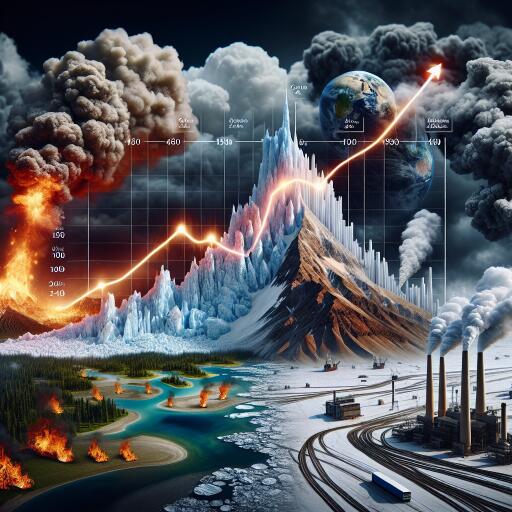
Climate in Crisis: Carbon Dioxide Emissions Skyrocket
The relentless march of carbon dioxide emissions reaches new heights, marking a pressing challenge in the global fight against climate change. The combustion of fossil fuels, including oil, coal, and natural gas, continues to play a significant role in the atmospheric accumulation of greenhouse gases, undermining efforts to curb global warming. The latest findings underscore the urgency of addressing this pivotal issue head-on.
In an in-depth analysis known as the Global Carbon Budget, researchers have meticulously measured the volume of carbon introduced into the atmosphere through the burning of fossil fuels alongside changes in land use. Moreover, they’ve accounted for the amount of carbon absorbed and stored by the earth’s oceans and landmasses. This comprehensive annual review reveals a concerning trend: fossil fuel emissions surged by 1.1 percent in 2023 compared to the previous year, resulting in a staggering total of 36.8 billion metric tons of carbon dioxide being released. Including additional sources like deforestation and extreme wildfire events, the total emissions for 2023 are estimated at 40.9 billion metric tons.
This continuous escalation in emissions is taking us further away from the path required to mitigate global warming impacts effectively. Since the dawn of the industrial age around 1750, carbon dioxide concentrations have skyrocketed from approximately 278 parts per million to 420 parts per million in the current year. This increase is closely linked to the planet’s rising temperatures, with 2023 marking the hottest year on record – a troubling 1.2 degrees Celsius warmer than the mid-20th-century average.
Utilizing state-of-the-art models, scientists have created detailed visualizations that trace the journey of carbon dioxide through our atmosphere. These models illustrate the primary sources of these emissions, including fossil fuels, biomass burning, and exchanges with land ecosystems and oceans. Despite the overwhelming emissions, it’s noteworthy that Earth’s natural sinks, the oceans, and land, still manage to absorb roughly half of the carbon we emit. This phenomenal natural process plays a critical role in moderating climate change impacts but is also influenced by these very emissions, leading to ocean acidification and shifts in land ecosystem functionalities.
Another significant finding is that the proportion of carbon dioxide that remains in the atmosphere has maintained a stable rate over the past 60 years, despite the increase in emissions. However, there’s growing concern among scientists regarding how long this equilibrium can be maintained. Recent studies reveal potential signs that the ocean, one of our largest carbon sinks, might be nearing its capacity to absorb carbon dioxide, thereby slowing its role in tempering climate change.
The Global Carbon Budget’s findings, based on a combination of government inventories and advanced satellite data, reveal a nuanced picture of carbon dioxide emissions across the globe. While some regions, such as Europe and the United States, show a decline in emissions, the global trend is unfortunately still on the rise, fueled by significant increases in countries like India and China.
In light of the Paris Agreement’s ambition to limit global warming to well below 2 degrees Celsius, the report also presents a stark reminder of the rapidly shrinking carbon budget. According to current emission trajectories, we face a 50 percent likelihood of exceeding the critical 1.5 degrees Celsius threshold within the next seven years.
This synthesis of data on greenhouse gas concentrations and emissions is part of a broader effort to equip policymakers with the necessary tools to forge an informed path forward. With the planet’s climate at a crossroads, the time for decisive action is now, underscoring the need for concerted global efforts to significantly reduce carbon emissions and avert the most severe impacts of climate change.





Leave a Reply